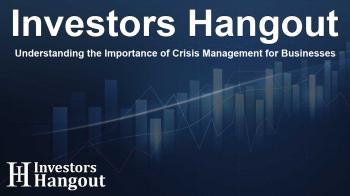Understanding the Importance of Crisis Management for Businesses

The Importance of Crisis Management for Businesses
Crisis management is a critical component in the survival and success of any organization. Recent survey data reveals a concerning trend that many businesses have not prioritized creating a communications-centered crisis plan. With the increasing likelihood of emergencies, it's alarming that a significant portion of business owners have never considered this crucial strategy.
In recent studies, a surprising 45% of business owners admitted they have never developed a crisis communication strategy. This is particularly troubling as the unpredictable nature of crises can significantly impact a company's reputation. Factors such as environmental disasters, market shifts, and even minor hiccups can trigger serious public relations challenges at any time. When these incidents arise, it's essential for businesses to have a game plan to manage them proactively.
The Risks of Inaction
Many businesses operate under the assumption that they are too small to face crises or that their internal processes will prevent significant issues. This type of thinking can be more detrimental than helpful. Without a properly crafted crisis plan, even small mistakes can escalate into full-blown PR disasters. A business’s reputation, painstakingly built over the years, can suffer immensely from a single event. Imagine the fallout from water contamination issues or a public faux pas, and how they could lead to loss of customer trust and financial decline.
A crisis can stem from various sources: from internal challenges like disgruntled employees to external factors such as natural disasters or economic shifts. Each of these can act as a spark, igniting a fire that could consume the organization’s reputation.
Why Businesses Neglect Crisis Plans
During a recent survey conducted with over one thousand businesses, we explored why so many had neglected to develop a crisis plan. Here are some of the top responses:
- "I've never thought about it"
- "I don't see it as a priority"
- "I don't know how to create one"
This perspective is alarmingly common. Many business owners feel overwhelmed by their day-to-day tasks and may not recognize the importance of crisis management. However, neglecting to prepare can lead to significant consequences, often resulting in lost revenue and damaged reputations. Crisis planning is not just a safety net; it’s a strategic advantage that every business needs.
Steps for Effective Crisis Management
Building a solid crisis management plan requires thoughtful consideration and strategic planning. Firstly, it is essential for each business to identify key roles and responsibilities within their teams. At a minimum, this should include:
- A decision-maker who is authorized to respond
- A spokesperson to communicate with the public
- An internal coordinator who ensures team alignment
This foundational structure supports resilience, enabling businesses to act quickly and effectively during a crisis. The synchronization of these roles can significantly enhance a company's preparedness, allowing them to tackle unforeseen challenges head-on.
Brand Resilience as a Core Strategy
Brand resilience involves not only being prepared for crises but also identifying potential risks before they escalate. A proactive approach involves clear messaging and effective communication strategies that resonate with stakeholders. It’s about leading conversations rather than simply reacting to them after the fact.
By focusing on strategic public relations, businesses can reinforce their brand integrity through transparency, communication, and empathy during critical moments. The goal is to maintain trust and credibility, even in the face of challenges.
Future Insights and Continuing Education
Our commitment to understanding the nuances of crisis management will continue as we analyze more data and insights. Stay tuned for a comprehensive white paper scheduled for release that will delve deeper into the findings of our recent survey.
In the meantime, businesses looking to enhance their crisis communication strategies can find valuable resources, guidance, and actionable tips. Staying informed about best practices in public relations will help prepare for the unexpected and mitigate potential crises.
Frequently Asked Questions
What is crisis management?
Crisis management refers to the strategies and actions a business takes to address and mitigate the fallout of unexpected incidents, protecting its reputation and operational stability.
Why do many businesses lack a crisis plan?
Many businesses may underestimate the need for a crisis plan, feeling overwhelmed by daily operations or believing that crises won't affect them.
What are the key components of a crisis management plan?
A solid crisis management plan should include defined roles, clear communication strategies, risk identification, and measures for responding to various types of crises.
How can businesses improve their crisis readiness?
Businesses can improve readiness by conducting risk assessments, developing communication strategies, and training staff on their roles in a crisis scenario.
What impact can a crisis have on a business?
The impact of a crisis can be severe, leading to financial loss, reputational damage, and diminished customer trust, emphasizing the need for preparedness.
About The Author
Contact Evelyn Baker privately here. Or send an email with ATTN: Evelyn Baker as the subject to contact@investorshangout.com.
About Investors Hangout
Investors Hangout is a leading online stock forum for financial discussion and learning, offering a wide range of free tools and resources. It draws in traders of all levels, who exchange market knowledge, investigate trading tactics, and keep an eye on industry developments in real time. Featuring financial articles, stock message boards, quotes, charts, company profiles, and live news updates. Through cooperative learning and a wealth of informational resources, it helps users from novices creating their first portfolios to experts honing their techniques. Join Investors Hangout today: https://investorshangout.com/
The content of this article is based on factual, publicly available information and does not represent legal, financial, or investment advice. Investors Hangout does not offer financial advice, and the author is not a licensed financial advisor. Consult a qualified advisor before making any financial or investment decisions based on this article. This article should not be considered advice to purchase, sell, or hold any securities or other investments. If any of the material provided here is inaccurate, please contact us for corrections.

